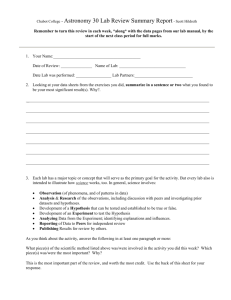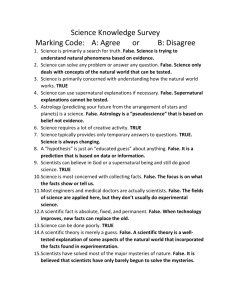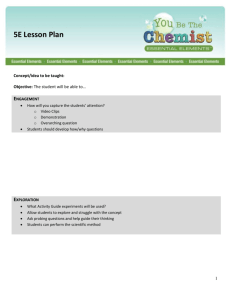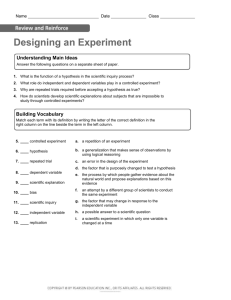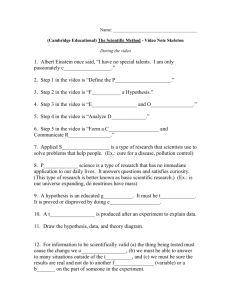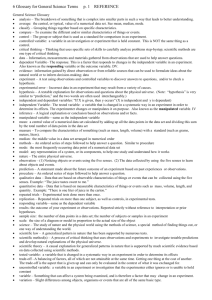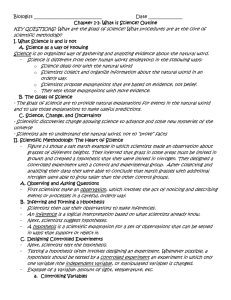Science Survey - Answer Key Discussion
advertisement
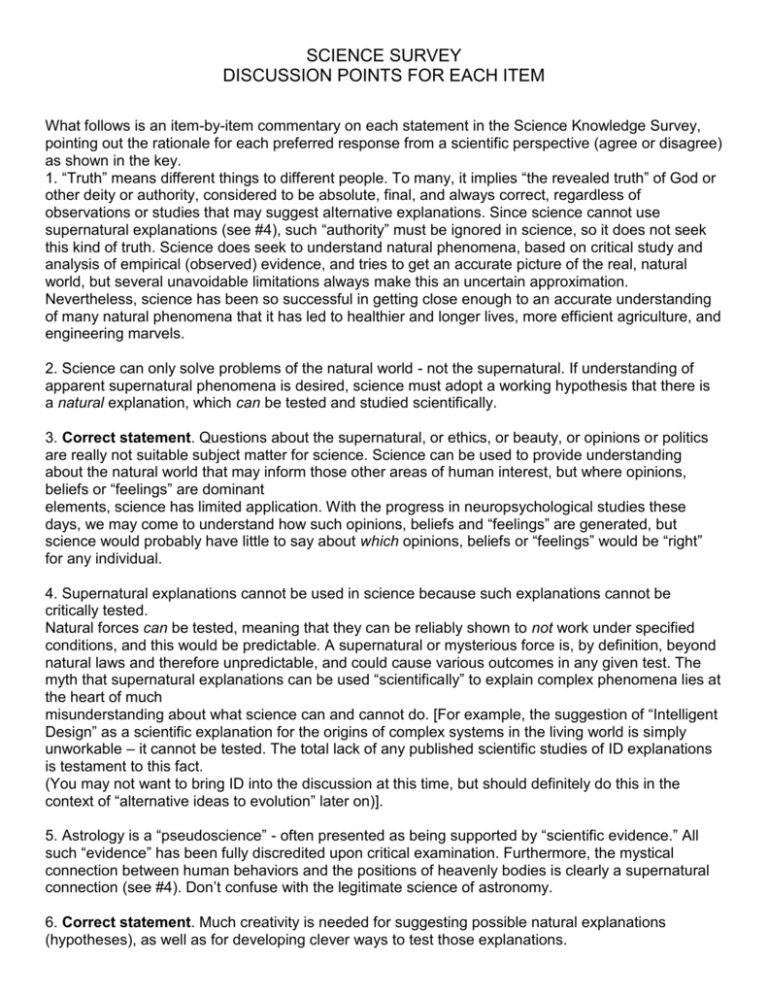
SCIENCE SURVEY DISCUSSION POINTS FOR EACH ITEM What follows is an item-by-item commentary on each statement in the Science Knowledge Survey, pointing out the rationale for each preferred response from a scientific perspective (agree or disagree) as shown in the key. 1. “Truth” means different things to different people. To many, it implies “the revealed truth” of God or other deity or authority, considered to be absolute, final, and always correct, regardless of observations or studies that may suggest alternative explanations. Since science cannot use supernatural explanations (see #4), such “authority” must be ignored in science, so it does not seek this kind of truth. Science does seek to understand natural phenomena, based on critical study and analysis of empirical (observed) evidence, and tries to get an accurate picture of the real, natural world, but several unavoidable limitations always make this an uncertain approximation. Nevertheless, science has been so successful in getting close enough to an accurate understanding of many natural phenomena that it has led to healthier and longer lives, more efficient agriculture, and engineering marvels. 2. Science can only solve problems of the natural world - not the supernatural. If understanding of apparent supernatural phenomena is desired, science must adopt a working hypothesis that there is a natural explanation, which can be tested and studied scientifically. 3. Correct statement. Questions about the supernatural, or ethics, or beauty, or opinions or politics are really not suitable subject matter for science. Science can be used to provide understanding about the natural world that may inform those other areas of human interest, but where opinions, beliefs or “feelings” are dominant elements, science has limited application. With the progress in neuropsychological studies these days, we may come to understand how such opinions, beliefs and “feelings” are generated, but science would probably have little to say about which opinions, beliefs or “feelings” would be “right” for any individual. 4. Supernatural explanations cannot be used in science because such explanations cannot be critically tested. Natural forces can be tested, meaning that they can be reliably shown to not work under specified conditions, and this would be predictable. A supernatural or mysterious force is, by definition, beyond natural laws and therefore unpredictable, and could cause various outcomes in any given test. The myth that supernatural explanations can be used “scientifically” to explain complex phenomena lies at the heart of much misunderstanding about what science can and cannot do. [For example, the suggestion of “Intelligent Design” as a scientific explanation for the origins of complex systems in the living world is simply unworkable – it cannot be tested. The total lack of any published scientific studies of ID explanations is testament to this fact. (You may not want to bring ID into the discussion at this time, but should definitely do this in the context of “alternative ideas to evolution” later on)]. 5. Astrology is a “pseudoscience” - often presented as being supported by “scientific evidence.” All such “evidence” has been fully discredited upon critical examination. Furthermore, the mystical connection between human behaviors and the positions of heavenly bodies is clearly a supernatural connection (see #4). Don’t confuse with the legitimate science of astronomy. 6. Correct statement. Much creativity is needed for suggesting possible natural explanations (hypotheses), as well as for developing clever ways to test those explanations. 7. Correct statement. Virtually all scientific statements start off as being tentative. With testing, many are replaced with better explanations, some become reinforced (increasing the likelihood of their validity), and a few become so well substantiated that they become widely and generally accepted as “reality” - e.g., the Earth is a globe - not flat.” 8. A hypothesis is typically a tentative, testable explanation. Many textbooks and teachers use the overly simplistic definition of “an educated guess.” Unfortunately, this leads students to assume that the predicted result of an experiment to test a hypothesis is the hypothesis - that what is actually a prediction IS the hypothesis. I would encourage teachers to help their students make a clear distinction between a hypothesis and a prediction - they are not the same thing. And a guess could be about anything; guessing that your teacher’s age is 34 is NOT a hypothesis - that’s not an explanation, tentative or otherwise. 9. Correct statement. Scientists exhibit the same wide range of religious views as the general population - with various beliefs about the nature and role of God - and as long as they avoid the use of God as the immediate cause for any phenomenon in the science that they do, they can be very effective scientists. 10. Because scientific understanding must be based on real-world observations, observed facts (‘data”) are an important part of scientific work. However, its major concern is with what the facts show us, what do the facts “say” that help us to understand how our natural world works? (see #3). Facts are just part of the means of getting there. 11. Engineering and medicine are two fields where the findings of science are applied. Most engineers or doctors do not do experimental science: formulating and testing hypotheses. Some do, and some do the science and practice its applications, but experimental science is not typically part of an engineer’s or doctor’s life. 12. A scientific fact is typically defined as an observation confirmed repeatedly by many critical observers. With improved tools, or new ways of observing, some scientific facts can be replaced with new facts. At one time, it was generally accepted as a fact that humans had 48 chromosomes in each cell. Later studies using improved techniques showed that there are only 46 chromosomes. The fact changed. 13. Correct statement. As in any human endeavor, some people are better at it than others, some are just not very good at doing science at all, and some scientists are even fraudulent. Fortunately, the ethics of science requires scientists to publish their work in peer-reviewed journals, where other scientists can critique the work and even repeat the work, so that sloppy or unreliable studies do not survive. Poor scientists don’t last long in the field. 14. A scientific theory is a well-substantiated explanation of some aspect of the natural world, incorporating facts, laws, inferences and well-tested hypotheses. In common usage, “theory” means a guess or speculation - far different from its scientific use. Unfortunately, even scientists will use the word in its vernacular sense, when they should be saying “hypothesis” or “hunch,” and this leads to much confusion. Users of “theory” should make very clear which meaning is intended, or avoid using the word. 15. Every scientific study that attempts to increase our understanding of some natural phenomenon always raises new questions and new problems. It has been estimated that science has just “scratched the surface” of the depths of our ignorance about the natural universe. Most of our ignorance is “Deep Ignorance” - things we don’t even know we don’t know! In other words, the more we learn, the more we realize how much we don’t know. Students interested in a career in science needn’t worry about having problems to work on! 16. Correct statement. Just as forensic scientists (CSI) can often come to learn who committed the crime in a fairly recent event, just by seeking and analyzing the evidence, paleontologists and astronomers can determine with fairly high confidence just what happened in the distant past to produce what we see today, just from the clues they seek and find. This is “historical” science, often lacking the steps of “experimental science” that The Scientific Method seems to suggest must characterize any legitimate science. Methods of historical science are just as effective in getting reliable answers as the experimental sciences. 17. Correct statement. Many of our current problems could have been prevented or reduced if political leaders, business leaders, and the voting public recognized how good science is done, and how its reliability is measured. The growing and undeniable evidence of man-made global warming (over natural warming) has been strongly (and increasingly) supported by scientific studies. Too many people in power, and most of the general public who could have created pressure, have simply not understood the potential benefit and power of science. Many people try to discredit science, or only look at the few studies that seem to fit their own vested interests or political leanings, and ignore the vast majority of scientific studies that clearly showed how our world is changing before it became obvious to everyone. We see this in quack medicine and many other frauds and pseudosciences that can be spread even faster now via the internet. Without knowing the nature of science, or how to critically analyze evidence, most of the world’s citizens are at the mercy of the hucksters. 18. There is still some of this (more common in earlier science). But most studies involve the testing of hypotheses, with predictable outcomes that differ depending on whether the hypothesis is correct or not. 19. “Scientific” is way overused, often applied to sell products, services or ideas when not deserved. Science can range from well-done to very poor (see #13), and even extend into the pseudosciences, where “studies” may claim to be “scientific,” but fail to follow one or more rules of science. So, just because it’s called “science” is no guarantee that it’s accurate and reliable. On the other hand, if it’s legitimate science, it’s more likely to be accurate and reliable than if it’s just based on some casual observations or anecdotal experiences. 20. Correct statement. This was once just a basic assumption of science, but over the years, repeated observations have confirmed the correctness of that assumption. We’ve had to refine and modify some old ideas (e.g., Newton’s laws of motion to Einstein’s rules of relativity at velocities near the speed of light), but they are clearly and observably universal as far as we can tell. 21. Correct statement. This is the heart and soul of science. If a possible explanation cannot be subjected to testing - efforts to show that it does not work - then the explanation is pointless (see #4). This testing is much like the testing of the safety of a car by crashing it into a wall; if the dummies in the car “survive,” the design is a good one. Likewise, if the hypothesis survives the testing, it’s probably a good one. 22. Correct statement. Science is done by people, who have the same biases anyone might have, and these biases do influence how we see the world, and what explanations might come to mind to help us understand that world. The beauty of science is that its rules tend to minimize the impact of bias and personal opinions on its solutions. With the requirement for publishing in peer-reviewed journals, and other scientists repeating the studies, personal biases tend to be discovered and eliminated. 23. Textbooks tend to imply that there is only one “Scientific Method” and encourage students to memorize the steps; as if that was the only way real science could be done. Overlooked are the many variations in approaches followed in different fields of science (see #16 for one example). Also often overlooked are the several critical aspects of science collectively termed “The Nature of Science” or NOS. This includes a clarification of what science IS and is NOT, its realm (limited to the natural world), its limits, rules and assumptions, its tentativeness, the role of biases, and its social nature (collaboration and peer-reviewed publishing). 24. Quite the contrary. Passionate disagreement leads to mutual critiquing of methods and ideas, and searches for more evidence, ultimately leading to resolutions that bring us closer to a more accurate understanding of the phenomenon. This is a decided strength of science. 25. Certainly, we would hope that any good science is done carefully and be based on observation, but not alone. This might work for a purely descriptive part of science (e.g., describing and classifying beetles). But any study worthy of being called “scientific” must include critical analyses of the findings, seeking explanations for what is observed, and testing those explanations.
